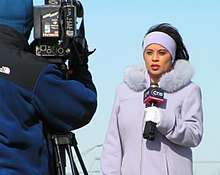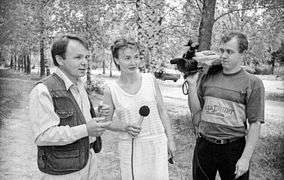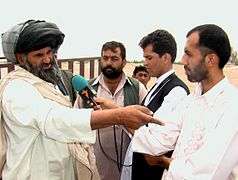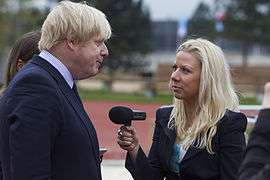Journalist
A journalist is a person who collects, writes, photographs, processes, edits or comments on news or other topical information to the public. A journalist's work is called journalism.
 A television reporter speaking into a microphone in front of a camera, 2005 | |
| Occupation | |
|---|---|
| Names | Journalist |
Occupation type | Journalism, mass media |
Activity sectors | Mass Media, public relations, politics, sports, business |
| Description | |
| Competencies | Writing skills, interpersonal skills |
Education required | Typically a bachelor's degree |
Fields of employment | Mass media |
Related jobs | Correspondent, Reporter, Columnist, Spokesperson, politician |
Roles
A reporter is a type of journalist who researches, writes and reports on information in order to present in sources. This may entail conducting interviews, information-gathering and/or writing articles. Reporters may split their time between working in a newsroom, or from home, and going out to witness events or interviewing people. Reporters may be assigned a specific beat or area of coverage.
Depending on context, the term journalist may include various types of editors, editorial-writers, columnists, and visual journalists, such as photojournalists (journalists who use the medium of photography).
Matthew C. Nisbet, who has written on science communication,[1] has defined a "knowledge journalist" as a public intellectual who, like Walter Lippmann, David Brooks, Fareed Zakaria, Naomi Klein, Michael Pollan, Thomas Friedman, and Andrew Revkin, sees their role as researching complicated issues of fact or science which most laymen would not have the time or access to information to research themselves, then communicating an accurate and understandable version to the public as a teacher and policy advisor.
In his best-known books, Public Opinion (1922) and The Phantom Public (1925), Lippmann argued that most individuals lacked the capacity, time, and motivation to follow and analyze news of the many complex policy questions that troubled society. Nor did they often directly experience most social problems, or have direct access to expert insights. These limitations were made worse by a news media that tended to over-simplify issues and to reinforce stereotypes, partisan viewpoints, and prejudices. As a consequence, Lippmann believed that the public needed journalists like himself who could serve as expert analysts, guiding “citizens to a deeper understanding of what was really important”. [2]
In 2018, the United States Department of Labor's Occupational Outlook Handbook reported that employment for the category, "reporters, correspondents and broadcast news analysts," will decline 9 percent between 2016 and 2026.[3]
Journalistic freedom
Journalists sometimes expose themselves to danger, particularly when reporting in areas of armed conflict or in states that do not respect the freedom of the press. Organizations such as the Committee to Protect Journalists and Reporters Without Borders publish reports on press freedom and advocate for journalistic freedom. As of November 2011, the Committee to Protect Journalists reports that 887 journalists have been killed worldwide since 1992 by murder (71%), crossfire or combat (17%), or on dangerous assignment (11%). The "ten deadliest countries" for journalists since 1992 have been Iraq (230 deaths), Philippines (109), Russia (77), Colombia (76), Mexico (69), Algeria (61), Pakistan (59), India (49), Somalia (45), Brazil (31) and Sri Lanka (30).[4]
The Committee to Protect Journalists also reports that as of December 1, 2010, 145 journalists were jailed worldwide for journalistic activities. Current numbers are even higher. The ten countries with the largest number of currently-imprisoned journalists are Turkey (95),[5] China (34), Iran (34), Eritrea (17), Burma (13), Uzbekistan (6), Vietnam (5), Cuba (4), Ethiopia (4), and Sudan (3).[6]
Apart from physical harm, journalists are harmed psychologically. This applies especially to war reporters, but their editorial offices at home often do not know how to deal appropriately with the reporters they expose to danger. Hence, a systematic and sustainable way of psychological support for traumatized journalists is strongly needed. However, only little and fragmented support programs exist so far.[7]
Journalist and source relationship
The relationship between a professional journalist and a source can be rather complex, and a source can sometimes have an effect on an article written by the journalist. The article 'A Compromised Fourth Estate' uses Herbert Gans' metaphor to capture their relationship. He uses a dance metaphor, "The Tango," to illustrate the co-operative nature of their interactions inasmuch as "It takes two to tango". Herbert suggests that the source often leads, but journalists commonly object to this notion for two reasons:
- It signals source supremacy in news making.
- It offends journalists’ professional culture, which emphasizes independence and editorial autonomy.
The dance metaphor goes on to state:
A relationship with sources that is too cozy is potentially compromising of journalists’ integrity and risks becoming collusive. Journalists have typically favored a more robust, conflict model, based on a crucial assumption that if the media are to function as watchdogs of powerful economic and political interests, journalists must establish their independence of sources or risk the fourth estate being driven by the fifth estate of public relations.[8]
The worst year on record for journalists
.jpg)
According to Reporters Without Borders' annual report, the year 2018 was the worst year on record for deadly violence and abuse toward journalists; there was a 15 per cent increase in such killings since 2017.[9][10] Ruben Pat was gunned down outside a Mexican beach bar. Yaser Murtaja was shot by an Israeli army sniper. Bulgarian Viktoria Marinova was beaten, raped and strangled. Jamal Khashoggi was killed inside Saudi Arabia's consulate in Istanbul on Oct 2.[11]
Gallery
 A program director sets the task for TV journalists, 1998.
A program director sets the task for TV journalists, 1998. A reporter interviews a man in Helmand Province, Afghanistan, 2009.
A reporter interviews a man in Helmand Province, Afghanistan, 2009.- Journalist interviews a cosplayer, 2012.
 A reporter interviewing Boris Johnson when he was Mayor of London, 2014
A reporter interviewing Boris Johnson when he was Mayor of London, 2014.jpg) Official tastes the water of a new well in front of journalists in Mogadishu, Somalia, 2014.
Official tastes the water of a new well in front of journalists in Mogadishu, Somalia, 2014.
See also
- 24-hour news cycle
- Broadcast journalism
- Electronic field production (EFP)
- Electronic news-gathering (ENG)
- List of ITV journalists and newsreaders
- List of journalists
- Local news
- News broadcasting
- News presenter
- News program
- Newsroom
- Outside broadcasting
- Student newspaper
- War correspondent
References
- Nisbet, Matthew C. (March–April 2009). "Communicating Climate Change: Why Frames Matter for Public Engagement". Environment Magazine. Heldref Publications. Taylor & Francis Group. Archived from the original on 3 July 2018. Retrieved 9 March 2019.
- Nisbet, Matthew C. (March 2013). "Nature's Prophet: Bill McKibben as Journalist, Public Intellectual and Activist" (PDF). Discussion Paper Series #D-78. Joan Shorenstein Center on the Press, Politics and Public Policy, School of Communication and the Center for Social Media American University. p. 7. Retrieved 8 March 2013.
- Talton, Jon (31 January 2018). "Occupational outlook: Where the big bucks are — and aren't". The Seattle Times. Retrieved 1 February 2018.
- "1337 Journalists Killed". Committee to Protect Journalists. Retrieved 28 August 2012.
- "Number of Jailed Journalists Nearly Doubles in Turkey". Los Angeles Times. 5 April 2012. Retrieved 6 April 2012.
- "Iran, China drive prison tally to 14-year high". Committee to Protect Journalists. 8 December 2010. Retrieved 18 November 2011.
- Tabeling, Petra (24 December 2014). "Petra Tabeling: In crisis areas, journalists are at risk in physical and psychological terms". D + C. p. 15. Retrieved 9 March 2019.
- Lewis, Justin; Williams, Andrew; Franklin, Bob (6 February 2008). "A Compromised Fourth Estate". Journalism Studies. 9: 1–20. doi:10.1080/14616700701767974.
- Langford, Eleanor (17 December 2018). "2018 was worst year for violence and abuse against journalists, report says". telegraph.co.uk. Telegraph Media Group Limited. Retrieved 7 January 2019.
- "WORLDWIDE ROUND-UP of journalists killed, detained, held hostage, or missing in 2018" (PDF). Reporters Without Borders. 1 December 2018. Retrieved 7 January 2019.
- Hjelmgaard, Kim (18 December 2018). "'Unscrupulous politicians' blamed for worst year on record for journalist killings". USA Today. Gannett. Retrieved 7 January 2019.
Bibliography
- Fowler, Nathaniel Clark. (1913). New York: Sully and Kleinteich.
- Huffman, James L. (2003). A Yankee in Meiji Japan: The Crusading Journalist. Lanham, Maryland: Rowman & Littlefield. ISBN 978-0-7425-2621-1
- Randall, David. (2000). The Universal Journalist. Sterling Virginia: Pluto Press. ISBN 978-0-7453-1641-3; OCLC 43481682
- Stone, Ejijah Melville. (1921) Fifty Years a Journalist. New York: Doubleday, Page and Company. OCLC 1520155
- Woods, Donald. (1981). Asking for Trouble: Autobiography of a Banned Journalist. New York: Atheneum. ISBN 978-0-689-11159-4; OCLC 6864121
External links
| Look up journalist in Wiktionary, the free dictionary. |

- Society of Professional Journalists